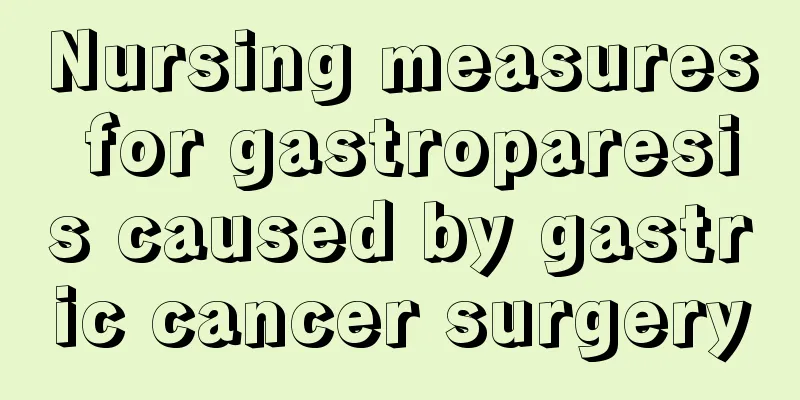Nursing measures for gastroparesis caused by gastric cancer surgery

|
Gastroparesis is a common complication after surgical resection of gastric cancer. Patients mainly experience gastrointestinal digestive dysfunction, such as abdominal distension, nausea, vomiting, etc. Relevant care should be provided to patients after surgery to avoid aggravating the condition. Gastrointestinal decompression tube care In the early stage after gastric cancer surgery, due to anesthesia and other reasons, the patient's residual stomach cannot discharge gastric contents in time, which is prone to retention and dilatation of the residual stomach. Therefore, it is necessary to fast in time and continuously and effectively perform gastrointestinal decompression to relieve symptoms and improve the treatment effect. Keep the gastrointestinal decompression drainage tube unobstructed, avoid folding, twisting, and falling off, pay attention to observe and record the nature and color of the drainage fluid, and flush and clean the drainage tube regularly every day. Parenteral Nutrition Nursing Patients with gastroparesis have some difficulty in eating orally and need parenteral nutrition to supply the body with appropriate amounts of vitamins, trace elements and electrolytes, maintain internal environment stability and protect cell function. Pay attention to the rational allocation of nutrient solution, which is generally prepared by doctors or nutritionists. At the same time, closely monitor the patient's weight and hemoglobin level, and adjust the amount of nutrient solution in time. Daily diet care As the condition improves, a gradual diet plan should be developed for the patient, based on the principle of eating small meals frequently and mainly liquid food. The patient can start with 20 mL and gradually increase to full liquid food. The increase should be based on the principle of keeping the patient without discomfort. The liquid food should mainly be unsweetened rice soup and vegetable soup. The patient should sit or semi-recumbent after meals to promote gastric emptying. Promoting gastric motility recovery care The anastomosis of the residual stomach of patients with gastroparesis is often accompanied by congestion and edema. Gastric lavage with hypertonic saline twice a day can reduce anastomotic edema. Gastrokinetic drugs can be used as prescribed by the doctor, such as oral domperidone or the traditional Chinese medicine Dachengqi Decoction, to enhance gastrointestinal motility and promote the gradual recovery of digestive function. |
<<: A proven Chinese medicine recipe for treating ascites caused by liver cancer
>>: Foods that help enhance the immunity of patients with lymphoma
Recommend
Care for life and do a good job in preventing lung cancer
The common symptoms of lung cancer are long-term ...
Does cactus protect against radiation? Don’t believe rumors about it
In the information technology age, whether you ar...
What to do if your hair is dry and yellow
As we all know, Chinese people's hair is pure...
Enlargement of the pancreatic tail
Enlargement of the tail of the pancreas is common...
The dangers of mouth breathing
Many people with rhinitis will choose to breathe ...
What are the dangers of holding urine
Holding urine is something that many people have ...
What does a mole on the inside of your arm mean?
There are many reasons why moles grow on the skin...
What are the effects of moxibustion on Quchi acupoint of the human body?
The human body's meridians are spread all ove...
Is red pork better or white pork?
Many people are not good at choosing pork when bu...
What should I do if I have a stuffy nose, cough and yellow phlegm?
We all know that there are viruses around us all ...
Brief analysis of four common types of malignant melanoma
Malignant melanoma is a more serious type of mela...
How to treat bone injuries
Many people often suffer physical injuries due to...
What are the symptoms of pubic cancer
The symptoms of pubic cancer are mainly local pai...
What to do if your hand is burned by spicy food
In life, many people like to eat chili peppers, b...
What is the best way to treat lung cancer? 4 effective treatments for lung cancer
What is the best way to treat lung cancer? The me...









